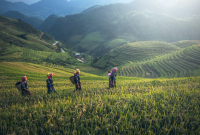Support strong Canadian climate journalism for 2025
Two weeks before the 28th UN climate change conference (COP28) kicked off in Dubai, I was at a women-led nature centre in the heart of Colombia. Conceived and managed by the Organización Femenina Popular (OFP), La Comunera is helping to lay the groundwork for a return to a balanced ecosystem in the region — from a feminist perspective.
Notably, just as COP28 was getting underway and raising eyebrows over its lack of female representation, UN Women released a report on feminist climate justice, advocating for targeted investment in this demographic.
“Women continue to drive ambitious climate action more than everywhere, including in their communities, cities, countries and regions,” said Amina Mohammed, the UN deputy secretary-general, during the conference’s Gender Equality Day.
She could have been referring to the OFP’s La Comunera, which launched in 2020.
You can say that La Comunera is a natural evolution of the work of the OFP, one of Colombia’s oldest women's collectives and movements. Based in Colombia’s Magdalena Medio watershed — a conflict area rich in resources and home to the country’s largest oil refinery — the OFP helps women who are impacted by conflict and gender-based violence empower themselves through psychosocial and legal support and human rights training to become powerful local peacebuilders.
KAIROS Canada has partnered with the OFP for more than 20 years.
Here there is a clear link between peace and environmental sustainability. La Comunera is literally restoring an area near Lebrija that was once a place of war.
It also serves to “rescue cultural memory,” says Kelly Campo, a member of the OFP’s co-ordinating committee.
La Comunera is born out of a long tradition of challenging colonial and patriarchal power, which is inherently top-down and treats nature and targeted human demographics as expendable. The OFP is putting into practice an alternative feminist approach to the one we have inherited.
La Comunera began with deep and widespread consultation, including with academics, architects, conservationists, environmentalists and, importantly, with local women who, like Indigenous Peoples, hold the cultural memory of sustainable engagement with local species. Due to the impacts of colonization, there are no Indigenous nations in the area.
The women at La Comunera grow produce, as well as medicinal plants that they distill into essential oils to sell as part of an income-generating project. They also tend to a few farm animals, manage a composting system, sell used clothing, educate the community about sustainability and offer the space as a refuge to restore mental health.
Campo regards the women involved in La Comunera as community scientists. A chemist by training, Campohas instilled scientific processes at the centre.
"Women know a lot from their experience because they have a very intimate relationship with plants,” she told El País.
“They are truly community scientists and guardians of life, but this dialogue of knowledge between the social and academic spheres is also important.”
Training and spreading knowledge and practice are key. Two hundred and fifty women were trained to take this knowledge to their communities in the Magdalena Medio. Called the Guardians of Life, this sister program to La Comunera is a network of 85 permanent women guardians who mobilize around reforestation, watershed recovery, eliminating plastic waste and other projects.
The OFP’s work with women peacebuilders and the environment through its Guardians of Life program has garnered praise from Global Affairs Canada, which gave it the Women, Peace and Security 2022 Award for Civil Society Leadership.
This award is very important for the OFP, which hopes its role in ecological restoration, like in peacebuilding, will be nationally and internationally recognized.
Canada also supports the OFP and similar organizations in other countries by funding KAIROS’ Women of Courage: Women, Peace and Security Program, part of its innovative Feminist International Assistance Policy (FIAP).
As we have witnessed, the work of women-led grassroots organizations like the OFP are critical players in peace and climate mitigation and adaptation efforts. Canada can play a significant role by fully investing in FIAP and increasing its climate finance commitments to the Global South to at least $1.8 billion annually — while prioritizing grassroots women’s and Indigenous organizations.
Canada could and should also advocate for increasing women’s participation in UN climate negotiations. Voices like the OFP are too vital to be sidelined.
Cheryl McNamara is a human and ecological rights activist and a playwright who serves as KAIROS Canada’s communications and advocacy co-ordinator.






Comments